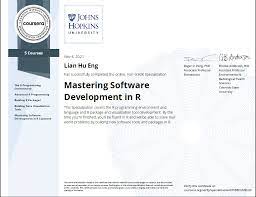Unlocking the Secrets of Mastering Software Development in R
The Art of Mastering Software Development in R
Software development in R is a powerful skill that can open up a world of possibilities for data analysis, visualization, and statistical computing. Whether you are a beginner or an experienced programmer, mastering software development in R can take your abilities to the next level.
Understanding the Basics
R is a programming language and software environment commonly used for statistical computing and graphics. To master software development in R, it is essential to understand the basics of the language, such as data types, functions, and control structures.
Building Efficient Algorithms
One key aspect of mastering software development in R is the ability to build efficient algorithms to process and analyze data. By leveraging R’s built-in functions and packages, developers can create complex algorithms that operate quickly and accurately.
Utilizing Packages and Libraries
R boasts a vast ecosystem of packages and libraries that extend its functionality for various tasks. Mastering software development in R involves knowing how to leverage these packages effectively to streamline your coding process and enhance your capabilities.
Creating Interactive Visualizations
Data visualization is a crucial aspect of software development in R. By mastering tools like ggplot2 and shiny, developers can create interactive visualizations that communicate complex insights effectively to stakeholders.
Collaboration and Version Control
To truly master software development in R, it is essential to embrace collaboration tools like Git for version control. Working collaboratively on projects allows developers to track changes, manage code efficiently, and ensure project integrity.
Continuous Learning and Practice
Like any skill, mastering software development in R requires continuous learning and practice. Engage with the vibrant R community through forums, workshops, and online resources to stay updated on best practices and new developments in the field.
In Conclusion
Mastering software development in R is a rewarding journey that empowers developers to tackle complex data challenges with confidence. By honing your skills in algorithm design, package utilization, visualization creation, collaboration, and continuous learning, you can become a proficient R developer ready to make an impact in the world of data science.
Mastering Software Development in R: Key Insights into Its Effectiveness, Roles, Methods, and Specializations
- Is r good for software development?
- What does an R developer do?
- What are two methods of program development?
- What is r Specialization?
Is r good for software development?
When considering whether R is suitable for software development, it’s important to understand its strengths and limitations. R is primarily designed for statistical computing and data analysis, making it an excellent choice for tasks related to these fields. While R may not be as versatile as general-purpose programming languages like Python or Java, its extensive collection of packages and libraries cater to a wide range of data-related tasks. Therefore, if your focus is on statistical analysis, data visualization, and machine learning applications, mastering software development in R can be highly beneficial. It’s all about choosing the right tool for the job based on your specific needs and objectives.
What does an R developer do?
An R developer specializes in utilizing the R programming language and its associated tools to create software solutions for data analysis, statistical modeling, and visualization. R developers work on tasks such as writing code to manipulate and analyze data, creating custom functions and algorithms, building interactive visualizations, and developing statistical models. They collaborate with data scientists, analysts, and other team members to translate complex data into actionable insights. Additionally, R developers often contribute to open-source projects, share their knowledge within the R community, and continuously enhance their skills to stay abreast of the latest advancements in software development in R.
What are two methods of program development?
When it comes to mastering software development in R, understanding different methods of program development is crucial. Two common approaches are the waterfall model and the agile methodology. The waterfall model follows a sequential process, with each phase completed before moving on to the next. On the other hand, the agile methodology emphasizes iterative development, allowing for flexibility and adaptation throughout the project lifecycle. By familiarizing oneself with these two methods of program development, developers can choose the approach that best suits their project requirements and work effectively towards mastering software development in R.
What is r Specialization?
The R Specialization refers to a focused program or course designed to help individuals master software development in R, a programming language commonly used for statistical computing and data analysis. This specialized training typically covers various aspects of R programming, such as data manipulation, visualization, statistical modeling, and package development. By completing an R Specialization, participants can deepen their understanding of R’s capabilities and enhance their skills in using it effectively for advanced data tasks. This targeted learning approach equips individuals with the knowledge and expertise needed to excel in software development projects that require proficiency in R programming.



